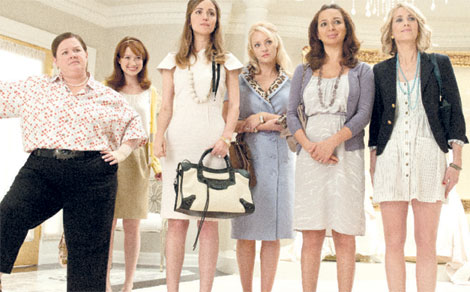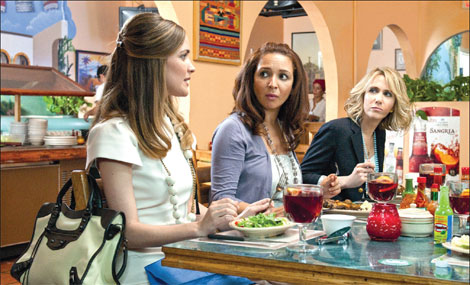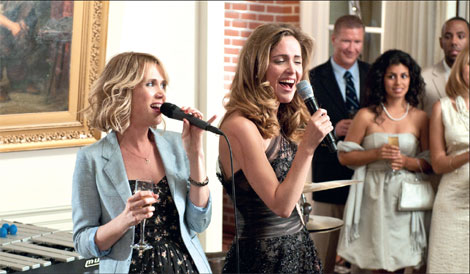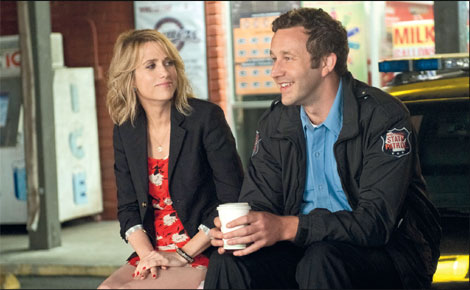Here come the Bridesmaids
Updated: 2011-09-17 06:47
By Elizabeth Kerr(HK Edition)
|
|||||||||
|
The Wedding Army begins its hunt for the perfect ugly bridesmaids' dress at the same time as the fight for friendship in the astute Bridesmaids. |
|
Lillian (Maya Rudolph, center) is stuck between her two closest friends, Helen and Annie (Rose Byrne, Kristen Wiig) while planning her wedding in Bridesmaids. |
|
Annie (co-writer Kristen Wiig) and Helen (Rose Byrne) begin the battle for the bride's affections at the awkward engagement party in Bridesmaids. |
|
Will Annie (Kristen Wiig) wind up with the right guy for her (Chris O'Dowd)? It's a rom-com. Of course she will. |
More of the same but somehow completely different. Elizabeth Kerr reports.
Well here's something you don't see everyday. One of this summer's biggest hits is yet another crass comedy from the Judd Apatow factory, but one that takes a run at the sub-genre from the feminine perspective. Strangely it's a film about women that actually kind of gets it.
What separates Bridesmaids from its more masculine and/or princess feminist peers (The Hangover Part II, 27 Dresses), aside from it's relatively tiny budget in the former case, is its unapologetic female focus. The film will be, and has been, labeled a rom-com or a chick flick, but there's far more to the execution of the idea of a "women's picture" than girls doing girly things for two hours. Men can absolutely do female characters - Pedro Almodvar and Stanley Kwan spring to mind as men that most definitely can - but the dominant Hollywood comedy format doesn't allow for it. Women have roles to fulfill and they are usually rigid ones (the virginal woman-child, the hussy, the mannish-career woman). Women are rarely allowed the dignity of being three-dimensional women.
As written by a pair of "XX" chromosome carriers, Saturday Night Live veteran Kristen Wiig and Annie Mumolo, Bridesmaids is a rom-com in the thinnest definition of the genre. There is a wedding at the narrative's core and some shaky romance for the main character, but both are simply tools for telling the real story, which is about the delicately tuned but fundamentally unshakable relationship between two girlfriends. Wiig's Annie (the character, not the co-writer) doesn't freak out because of her best friend's engagement; she freaks out because it threatens their bond. Annie isn't trying to hold on to the guy. She's trying to hold on to her BFF.
Bridesmaids aims much higher than its ilk. The film is about sex, friendship, class, beauty and how all of those affect a woman's self-worth and for the most part does it well. Annie (Wiig) is at a fragile place in her life. Her bakery business just went belly up, she's in a dead-end relationship with a self-involved philanderer (a hilarious uncredited bit part by Jon Hamm), and she's stuck in an apartment with the creepiest brother-sister pair of all time. The one constant comfort in her life is Lillian (Maya Rudolph), her closest friend. When Lillian springs the news on her that she's engaged Annie doesn't quite know how she feels about the happy news. Things go from bad to worse when her polar opposite, Helen (Rose Byrne), starts to wrest Lillian's attention and affection from her. Annie's thin veil of control slips. Badly.
Bridesmaids isn't really a single film so much as a picaresque portrait of a woman struggling to find her footing during a rocky patch in her life; everything is a danger to that process. The episodic nature of the storytelling shows off Wiig's sketch comedy background, and television director Paul Feig's (The Office, Weeds, Arrested Development) sense of commercial break pacing intensifies that. Ironically too many segments drag on too long and leach whatever power they had away, but Wiig, Rudolph, and Byrne hold everything together.
Wiig has an everywoman appeal that makes Annie sympathetic, regardless of the fact she's just not that nice. She's one person with Lillian, but quite another with rival Helen and the decent state trooper, Rhodes (Chris O'Dowd), she falls into a clumsy romance with. Fortunately, Wiig makes Annie relatable as opposed to irritating, so when she has an epic meltdown at the wedding shower the scene dances between funny and pathetic, cathartic and humiliating.
But Rudolph and Byrne in particular are given the thankless jobs of humanizing characters that could easily be the stereotypes you see in, say, Knocked Up. Rudolph does a nice job of telegraphing the balancing act Lillian is caught doing. She's getting married. She wants her wedding to be memorable. She's aware something is up with Annie but has to prioritize something/someone else just this one time. She's patient but not to the degree movie characters often are. How many times have you watched so-called buddy characters and wondered, "Why is he even talking to that guy?" That doesn't happen here.
Byrne (X-Men: First Class) has the most difficult task by far. Helen is the rich, beautiful, connected princess. Everything she touches turns to gold. She succeeds wherever Annie fails. And when Lillian flirts with her as a new BFF Annie loses it. But Byrne manages to shade Helen with a touch of tragedy. She's a trophy wife whose step-kids hate her, and she really has no clue how to relate to other women in a non-competitive way. Some judicious editing would have been welcome. Still, the underhanded, passive-aggressive engagement party throwdown between her and Annie is a clinic in awkward, close to the bone humor.
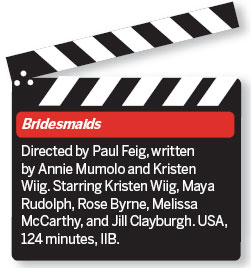
Bridesmaids strictly adheres to its comedy formula, and it hits all the beats at the right time that you expect it to on the way to happily ever after. The "freakshow" that is the bridal party is rounded out by Rita (Wendi McLendon-Covey), a disillusioned housewife, under-experienced newlywed Becca (Ellie Kemper) who's mistakenly bought into the myth of married life, and scene-stealer Megan (Melissa McCarthy), an aggressive, over-compensating horndog able to see the big picture.
Is Bridesmaids feminist filmmaking? Perhaps. These women are far more real than many that populate the movies these days, and the film features Jill Clayburgh's last performance, an actress who was an icon of '70s feminist filmmaking (shout-out or coincidence?). Sadly, Feig's Apatow-ian instincts take over from time to time, and the film dives into juvenile, gross-out waters on a few occasions - chiefly the dress fitting sequence - that detract from the pointed observational comedy of the rest of the film. Were Wiig and Mumolo proving that girls could play that game too? Maybe, but there was no need; the girls were being plenty funny, and genuine, on their own terms before that. Whether it was rising to the challenge or stooping to the perceived mass market comes down to personal taste. I'm going with rising to the challenge and hoping next time Wiig truly does write what she wants to.
Bridesmaids opened in Hong Kong on Thursday.
(HK Edition 09/17/2011 page4)
